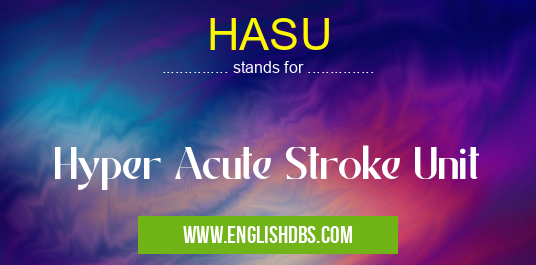What does HASU mean in THERAPY
HASU stands for Hyper Acute Stroke Unit. It is a specialized medical unit within a hospital that is dedicated to the rapid assessment, diagnosis, and treatment of patients who have experienced a stroke. Stroke is a medical emergency that requires immediate attention to prevent serious complications and long-term disability. HASU plays a crucial role in providing time-sensitive and comprehensive care to stroke patients.

HASU meaning in Therapy in Medical
HASU mostly used in an acronym Therapy in Category Medical that means Hyper Acute Stroke Unit
Shorthand: HASU,
Full Form: Hyper Acute Stroke Unit
For more information of "Hyper Acute Stroke Unit", see the section below.
What is a HASU?
A HASU is a dedicated unit within a hospital that is equipped with advanced technology and staffed by a team of highly trained healthcare professionals, including neurologists, stroke nurses, and other specialists. The unit is designed to provide rapid and specialized care to patients who have experienced a stroke.
Key Functions of a HASU
- Rapid Assessment and Diagnosis: Patients are assessed and diagnosed promptly upon arrival at the HASU. Neuroimaging tests, such as CT scans or MRI scans, are performed to determine the type and location of the stroke.
- Time-Sensitive Treatment: Stroke treatment is time-sensitive, and HASUs are equipped to administer clot-busting medications or perform other interventions to restore blood flow to the brain.
- Intensive Monitoring: Patients in a HASU are closely monitored for any changes in their condition or complications. This allows for early detection and prompt intervention, which can improve patient outcomes.
- Multidisciplinary Care: HASUs provide multidisciplinary care, involving neurologists, stroke nurses, physical therapists, occupational therapists, speech therapists, and other specialists who work together to develop an individualized care plan for each patient.
- Patient and Family Support: HASUs offer support to patients and their families throughout the stroke journey, providing information, emotional support, and guidance on rehabilitation and recovery.
Essential Questions and Answers on Hyper Acute Stroke Unit in "MEDICAL»THERAPY"
What is a HASU?
A Hyper Acute Stroke Unit (HASU) is a specialized hospital unit dedicated to providing immediate and comprehensive care for patients who have experienced an acute stroke. It is staffed by a team of highly trained professionals, including neurologists, nurses, and other medical specialists.
When should I go to a HASU?
You should go to a HASU as soon as possible if you experience any symptoms of a stroke, such as sudden weakness or numbness on one side of the body, difficulty speaking or understanding speech, or vision problems. Strokes are medical emergencies, and timely treatment in a HASU can improve outcomes.
What happens in a HASU?
In a HASU, you will undergo a thorough examination and imaging tests to confirm the diagnosis of stroke and determine its severity and location. You will be monitored closely and receive immediate treatment to stabilize your condition, prevent further damage, and promote recovery. Treatment may include medications to dissolve blood clots, surgery to remove blockages, or therapies to improve blood flow.
What are the benefits of being treated in a HASU?
Treatment in a HASU can significantly improve outcomes for stroke patients. Stroke specialists have the expertise and resources to provide rapid and effective treatment, which can reduce the risk of disability and death. HASUs also offer specialized rehabilitation services and support to help patients recover from their stroke and regain their independence.
How long will I stay in a HASU?
The length of your stay in a HASU will depend on the severity of your stroke and your response to treatment. Most patients stay for a few days to a week, but some may require longer-term care.
What happens after I leave the HASU?
After you leave the HASU, you will continue to receive care from a team of healthcare professionals to manage your recovery. This may include follow-up appointments, rehabilitation therapy, and lifestyle changes to reduce your risk of another stroke.
Final Words: HASU is a critical component of stroke care that provides specialized and timely treatment to patients who have experienced a stroke. By offering rapid assessment, diagnosis, and treatment, HASUs aim to improve patient outcomes, reduce long-term disability, and enhance the quality of life for stroke survivors.
HASU also stands for: |
|
| All stands for HASU |
